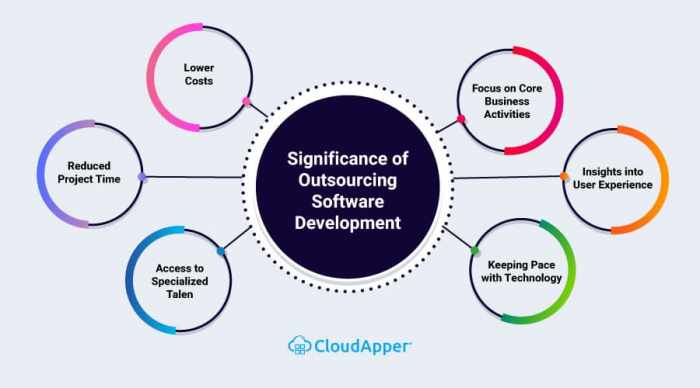In today’s dynamic business landscape, leveraging technology is paramount for growth and competitiveness. Custom software development offers businesses tailored solutions to meet their specific needs, but the in-house development process can be expensive and time-consuming. This is where custom software development outsourcing comes into play, offering a cost-effective and efficient alternative. This comprehensive guide delves into the intricacies of outsourcing custom software development, exploring its benefits, challenges, and best practices to help you make informed decisions.

Understanding Custom Software Development Outsourcing
Custom software development outsourcing involves contracting a third-party company, often located overseas, to design, develop, and maintain software applications tailored to your business requirements. This differs from using off-the-shelf software, which offers limited customization options. Outsourcing allows businesses to access specialized expertise and resources without the significant investment in internal teams and infrastructure.
Custom software development outsourcing offers businesses significant advantages, including cost savings and access to specialized talent. A popular strategy involves partnering with a nearshore software development partner , which often provides a balance between cost-effectiveness and ease of communication. Ultimately, selecting the right outsourcing model for your custom software development needs is crucial for project success.
Types of Outsourcing Models
- Onshore Outsourcing: Hiring a development team within your own country.
- Nearshore Outsourcing: Outsourcing to a neighboring country, often sharing similar time zones and cultural aspects.
- Offshore Outsourcing: Outsourcing to a geographically distant country, often resulting in significant cost savings but potentially introducing communication and time zone challenges.
Key Benefits of Outsourcing Custom Software Development
- Cost Savings: Significantly lower labor costs, especially with offshore outsourcing.
- Access to Specialized Skills: Tap into a global talent pool with expertise in specific technologies and domains.
- Faster Time to Market: Leverage the dedicated resources of the outsourcing team to accelerate development cycles.
- Increased Efficiency and Productivity: Focus on core business functions while outsourcing non-core activities.
- Scalability and Flexibility: Easily scale your development team up or down based on project needs.
- Reduced Infrastructure Costs: Eliminate the need for significant investments in hardware, software, and office space.
Choosing the Right Outsourcing Partner
Selecting a reliable and competent outsourcing partner is crucial for project success. Consider these factors:
Essential Criteria for Partner Selection
- Experience and Expertise: Review the partner’s portfolio, client testimonials, and technology proficiency.
- Communication and Collaboration: Assess their communication channels, responsiveness, and project management methodologies.
- Security and Confidentiality: Ensure they have robust security measures in place to protect your intellectual property.
- Pricing and Contract Terms: Carefully review the contract, including payment terms, intellectual property rights, and service level agreements (SLAs).
- Cultural Compatibility: Consider cultural differences and their potential impact on communication and collaboration.
- Technical Stack Alignment: Ensure the outsourcing partner’s expertise aligns with your project’s technological requirements (e.g., .NET, Java, Python, React, Angular).
Managing the Outsourcing Process
Effective project management is essential for successful outsourcing. Establish clear communication channels, utilize project management tools, and regularly monitor progress.

Effective Project Management Strategies
- Detailed Requirements Documentation: Create comprehensive documentation outlining project specifications, functionalities, and deadlines.
- Regular Communication and Reporting: Implement regular meetings, progress reports, and feedback mechanisms.
- Agile Development Methodologies: Employ agile approaches for iterative development and flexible adaptation to changing requirements.
- Version Control and Code Management: Utilize version control systems (e.g., Git) for efficient code management and collaboration.
- Quality Assurance and Testing: Implement rigorous testing procedures throughout the development lifecycle.
- Risk Management: Identify and mitigate potential risks, such as communication breakdowns, security breaches, and delays.
Challenges of Outsourcing Custom Software Development
While outsourcing offers numerous benefits, it’s important to acknowledge potential challenges:

Potential Pitfalls to Avoid
- Communication Barriers: Language differences and time zone discrepancies can hinder communication and collaboration.
- Quality Control Issues: Ensuring consistent quality can be challenging when working with a remote team.
- Security Risks: Protecting intellectual property and sensitive data requires robust security measures.
- Cultural Differences: Differences in work ethics and communication styles can impact project dynamics.
- Hidden Costs: Unexpected costs can arise from communication issues, delays, or unforeseen technical challenges.
Frequently Asked Questions (FAQ)
- Q: How much does custom software development outsourcing cost? A: Costs vary significantly depending on project complexity, development team location, and other factors. Obtain detailed quotes from multiple vendors.
- Q: How do I choose the right technology stack for my project? A: Consider factors such as scalability, maintainability, security, and the availability of skilled developers. Consult with experienced developers or outsourcing partners.
- Q: How can I protect my intellectual property when outsourcing? A: Utilize non-disclosure agreements (NDAs), secure communication channels, and robust security measures. Choose a reputable outsourcing partner with a proven track record.
- Q: What are the key indicators of a successful outsourcing partnership? A: Clear communication, timely delivery, adherence to agreed-upon specifications, and a proactive approach to problem-solving.
- Q: How can I manage the risks associated with outsourcing? A: Thorough due diligence, clear contracts, regular communication, and proactive risk mitigation strategies.
Conclusion
Custom software development outsourcing presents a powerful opportunity for businesses to leverage global talent and resources, achieving cost savings, increased efficiency, and faster time to market. By carefully selecting a reputable outsourcing partner, implementing effective project management strategies, and addressing potential challenges proactively, businesses can significantly enhance their software development capabilities and achieve their strategic objectives. Remember to thoroughly research potential partners and clearly define project requirements before embarking on an outsourcing initiative.
References
- Gartner (for market research and insights on IT outsourcing)
- Forbes (for articles on business technology and outsourcing)
- CIO (for articles on IT management and outsourcing)
Call to Action
Ready to explore the benefits of custom software development outsourcing? Contact us today for a free consultation and let us help you find the perfect outsourcing partner to meet your business needs.
